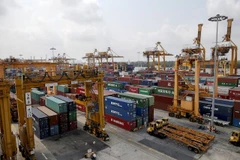 (From left) World Bank lead economist for Malaysia Dr Apurva Sanghi, country manager Yasuhiko Matsuda, and external affairs officer Joshua Foong. (Photo: theedgemalaysia.com)
(From left) World Bank lead economist for Malaysia Dr Apurva Sanghi, country manager Yasuhiko Matsuda, and external affairs officer Joshua Foong. (Photo: theedgemalaysia.com) Kuala Lumpur (VNA) - Malaysia's economy is projected to moderate to 3.9 % this year before bouncing to 4.3 % in 2024 on the back of domestic private sector spending, said the World Bank (WB)
“The situation can be seen through Malaysia’s exports numbers, which contracted by 3.3% in the first quarter and 9.4% in the second quarter of this year”, WB lead economist Apurva Sanghi told reporters at the release of the October 2023 East Asia and Pacific (EAP) Economic Update and part one of the September 2023 Malaysia Economic Monitor in Kuala Lumpur on October 2.
Apurva said Malaysia was sensitive to changes in external demand, especially regarding the country’s largest trading partners, namely the US and China.
The bank estimated that a 1 percentage point fall in the US growth rate could reduce Malaysia’s economic growth by 0.82 percentage point, and a 1 percentage point fall in China’s GDP growth rate could drag Malaysia’s GDP down by 0.45 percentage point.
According to the economist, domestic factors, including the base effect from high growth 2022 and extreme weather events, affected agriculture output earlier this year.
The WB added that Malaysia’s economy is projected to grow to 4.3% in 2024./.


























